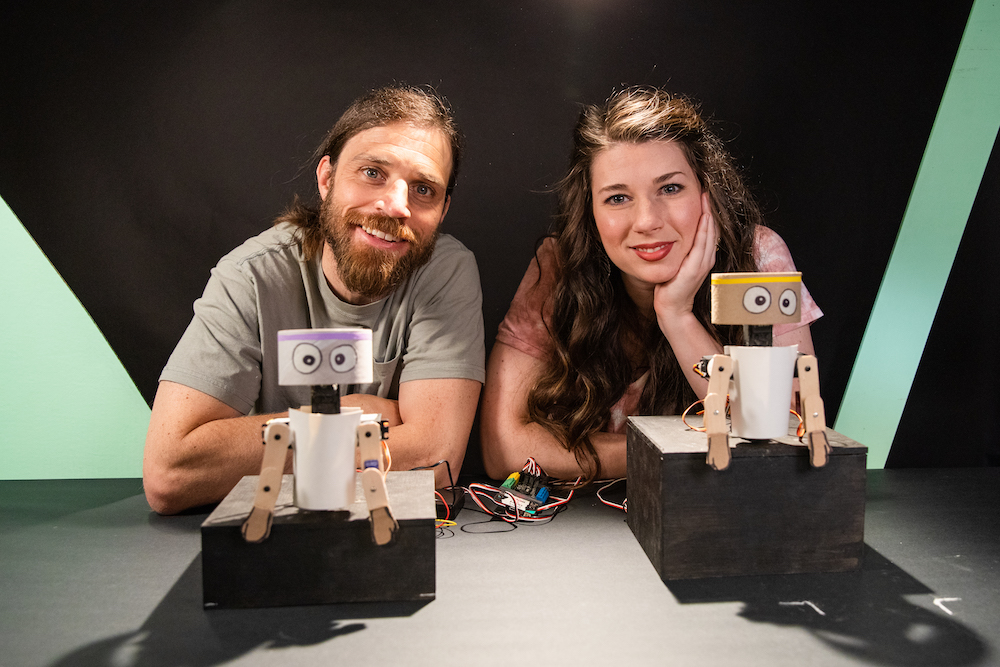Since their company is based in Squirrel Hill, CodeJoy cofounders Kelsey Derringer and Matt Chilbert like to say they’re operating in Mister Rogers’ neighborhood. However, geography isn’t the only thing Derringer and Chilbert hope to share with the man whose television show remains popular among educators due to its focus on emotional learning.
As an edtech startup, CodeJoy develops interactive robots and content that’s used to virtually teach students and educators about coding and authenticity.
“Fred Rogers’ whole theory of education and how television could be important and instrumental is really influential for us in terms of how a lot of interactive, online learning can be influential in students’ lives,” Derringer said. “We’re not doing BattleBots. The shows that we put together are very creative, encouraging and collaborative. We’re really trying to speak to diverse students and welcome them into the robotics party.”

Derringer and two robots. (Courtesy photo)
CodeJoy’s story began in 2020 at a time when, because the world was shutting down, a startup that revolved around the idea of offering interactive, online robotics classes wasn’t as tough a sell as they originally thought it’d be. Through CodeJoy, Derringer and Chilbert show students the results of the coding they’ve learned in real time.
“For students, we do what basically amounts to a live interactive TV show for kids, where we teach them how to code,” Derringer said. “And then their code that they write live during the show actually controls our robots also live during the show.”
Both Chilbert and Derringer have teaching experience, Chilbert from time in California and Derringer from working with the YWCA and Carnegie Science Center on STEM programming. Their shared teaching background comes in handy with the work they do at CodeJoy. Derringer explained that although most school administrators understand how important STEM education is for their students, not a lot of teachers are trained to teach STEM effectively. That’s why they reach out to CodeJoy, which offers to teach the teachers as well as their students.
“We do our best to teach these with good pedagogy and to teach them with our best teaching skills as well so that we’re creating those fun experiences for kids,” Derringer said.

CodeJoy’s main character, Elby. (Courtesy photo)
So far, CodeJoy has served roughly 6,000 students in the Pittsburgh region, 20 schools in New Kensington, and between 30,000 and 40,000 students nationally and internationally. After winning fourth place and $150,000 in the Richard King Mellon Foundation’s second Social Impact Pitch Competition in February, the founders are hoping to expand their reach.
“We’re planning on using that funding for moving out of the garage into a new space and hiring some staff to expand our operations and actually doubling our studio space, so that we can continue to serve the increased number of teachers in schools who’ve reached out to us wanting our services,” Chilbert said.
Through the years CodeJoy has secured partnerships with BirdBrain Technologies, the Micro:bit Educational Foundation and the Pittsburgh Gateways Foundation. Chilbert and Derringer explained that one of the main ways CodeJoy reaches students is through large grant-funded initiatives. But the company also has robotics kits for teachers and students, as well as the BBC micro:bit a classroom computing tool for sale on its website.
In the long term, the company hopes to add to its modest team, which currently consists of Chilbert, Derringer and a director of operations. For the time being, Derringer and Chilbert want to use their tech to reach as many students as possible.
“I firmly believe that if Fred Rogers could have stepped into every classroom in the Pittsburgh area, he would have,” Chilbert said. “This new technological landscape allows us to do that.”
Atiya Irvin-Mitchell is a 2022-2024 corps member for Report for America, an initiative of The Groundtruth Project that pairs young journalists with local newsrooms. This position is supported by the Heinz Endowments.Join the conversation!
Find news, events, jobs and people who share your interests on Technical.ly's open community Slack





